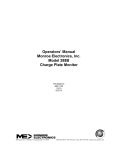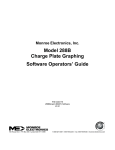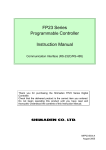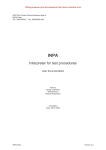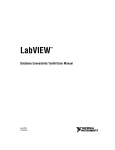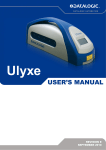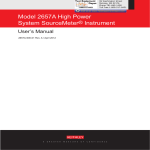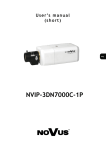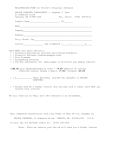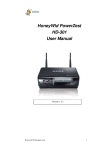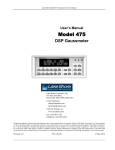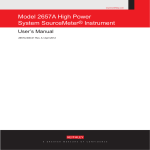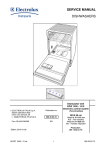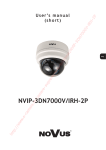Download IONIZATION SOLUTIONS - Ziegener + Frick GmbH
Transcript
IONIZATION SOLUTIONS Charge Plate Monitor Model 280A User’s Manual About Simco-Ion Simco-Ion serves the semiconductor, mass storage, flat panel display (FPD), general electronics, automotive, medical device, and aerospace industries with products that uniquely monitor, analyze and control electrostatic forces, thereby improving the production yield. Simco-Ion is a wholly-owned subsidiary of Illinois Tool Works (ITW) with its Technology Group located in Alameda, California. For more information about Simco-Ion visit www.simco-ion.com or call 800-367-2452. Simco-Ion is ISO 9001 and ANSI ESD S20.20 certified. © 2011 Simco-Ion 19-0280A-M-01 Rev 3 Contents 1 Description .......................................................................... 1 1.1 Model 280A CPM..................................................................................... 2 1.2 Parts of the CPM...................................................................................... 4 1.3 Performance .......................................................................................... 10 2 Setup .................................................................................. 11 2.1 Setup and Menus................................................................................... 12 3 Operation ........................................................................... 17 3.1 Manual Operation .................................................................................. 18 3.2 Manual Test Programming Features ..................................................... 22 3.3 Automatic Operation .............................................................................. 24 3.4 Auto Sequence Test Programming Features......................................... 26 3.5 Additional Features ................................................................................ 28 4 Maintenance ...................................................................... 31 4.1 Cleaning................................................................................................. 32 4.2 Battery.................................................................................................... 33 4.3 Charge State Indicator ........................................................................... 34 4.4 Calibration.............................................................................................. 35 5 Specifications.................................................................... 37 6 Warranty & Service ........................................................... 41 7 References......................................................................... 43 Appendix A: Downloading Test Results ............................. 45 19-0280A-M-01 Rev 3 1 Description 1.1 Model 280A CPM 1.2 Parts of the CPM 1.3 Performance 19-0280A-M-01 Rev 3 1 1.1 Model 280A CPM The Model 280A Charged Plate Monitor (CPM) is a microprocessorbased tool, providing an automated solution for measuring the performance of air ionization systems. The unit features a simple push-button LCD interface, and allows data transfer to computers for precise and specific test information. All instrument functions are controlled by five key pushbuttons. Included with the unit is a CD with software for transferring data between the CPM and a computer. The Model 280A CPM allows for testing where initial voltages of 1000V (or less) are involved. For further details see ESD Association Standard S3.1 for Protection of Electrostatic Discharge Susceptible Items - Ionization. The unit is completely portable, with up to six hours of operation on the internal battery and memory for storage of over 1000 tests. Model 280A performs manual or automatic decay and balance tests for qualification and periodic verification of ionization equipment. It then stores the results and balance averages for manual tests and complete automatic test sequences up to a maximum of 1500 tests. Temperature and relative humidity are displayed real-time and recorded with the test data. In DECAY mode a built-in high voltage generator charges the plate to a voltage specified by the user - up to 1100 volts. During the test the plate will discharge toward zero in the presence of ionization. The elapsed time of decay between a selected start voltage and a selected stop voltage is displayed. In the BALANCE mode, the plate is first grounded then released from ground and allowed to float to any voltage in response to air ion imbalances. It displays the plate voltage, test duration, and minimum and maximum peak voltages. (Nearby charge sources will also induce a voltage on the floating plate.) 19-0280A-M-01 Rev 3 2 Self-tests include battery check and tests for functional errors. Memory is non-volatile. Setup and data are retained during storage. Caution: When charged, the plate voltage can be in excess of 1100 volts with respect to ground. Although the charges and potentials are below those that are normally detected by human senses, A SHOCK HAZARD EXISTS. • If you are handling the plate assembly or conducting a test, which involves touching the plate, expect a shock. • Do not charge large capacitors with this device. 19-0280A-M-01 Rev 3 3 1.2 Parts of the CPM The 280A CPM features a large, central digital display used as an interface for all menus, buttons, and test information. A bargraph LED featured to the right of the central display indicates plate voltage. The following sections describe the CPM: • Charge Plate Monitor • CPM Front Panel • CPM Back Panel • Charge Plate • Accessories 19-0280A-M-01 Rev 3 4 Front of Unit Figure 1. Charge Plate Monitor A. Ground Snap: Connects plate to the unit. B. Decay Verification/Confidence Test Hole: Small hole uses provided thumbscrew on the back of the unit for confidence tests. C. Charge Plate: Charges to specified voltage and is ion target for decay and balance test. D. Release Button: When pressed, the plate is released from the unit. E. LED Bar Graph: Three ranges are provided with a maximum resolution of less than 10 volts for making fast assessments of plate voltage and polarity around zero. F. Range Switch: Selects the voltage range of the bar graph LEDs (x1, x2, x5). G. Soft Keys: Used to select onscreen menu choices. H. Power on/off button. 19-0280A-M-01 Rev 3 5 I. Central Display Screen: Interface for running tests and setting test data. J. Vertical Plate Mounts: Allows plate to be mounted on the side of the unit. CMP Front Panel Figure 2. CPM Front Panel A. Power LED: Lights steadily green when CPM is powered by AC line cord, and blinks green when powered by the battery. B. Power On/Off Button C. Soft Keys: Keys correspond with display screen to act as navigation buttons. D. Range Switch: Selects the voltage range of the bar graph LEDs (x1, x2, x5). E. Bar Graph LED: Shows plate voltage range at all times. F. Central Display Screen: Shows all menu activity, provides soft key choices, displays current conditions and settings. 19-0280A-M-01 Rev 3 6 Back Panel Figure 3. CPM Back Panel A. Power Input Receptacle B. RS-232 Serial Port: Connects to a computer for uploading and downloading test data. C. Ground Jack: Connects to provided ground cable or additional grounding devices. D. Temperature/Humidity Sensors: Takes measurements and logs read-only information, accessible through the Setup menu. E. Thumbscrew: Removes to connect to plate for confidence tests. F. Analog Output: The output monitors the plate voltage during any test (otherwise set to zero). Output is 1/200th of plate voltage. G. Contrast Trimpot: Manual trimpot adjusts the darkness and lightness of the screen, in addition to backlight setting. H. Plate Connection with BNC Terminator: Connects to plate. 19-0280A-M-01 Rev 3 7 Charge Plate Figure 4. Charge Plate A. Ground Snap: Connects the plate to the unit. B. Charge Plate: Top part of the whole plate is the active sensor. C. Grounding Plate: Provides ground when correctly connected to the main unit ground connection. D. Front Notch: Hold plate in place. E. Release Notch: Cutout for the release button on main unit. F. Confidence Hole: Receives the thumbscrew stored on the back of the unit. G. Connection Cable: Connects to the unit cable to complete plate connection. Note: The Charge Plate can be disconnected from the Grounding Plate. For accurate readings, these plates must be connected when using the plate remotely. 19-0280A-M-01 Rev 3 8 Supplied Accessories Figure 5. Supplied Accessories A. Plate Extension Cable: Provides extra distance for remote plate placement. B. Grounding Cable: Snaps to plate and unit for a ground connection. C. AC Power Cord D. Ground Extension Cable: Provides additional grounding method and extends ground cable length. E. Software Disk: Contains software for communicating test data with a computer. 19-0280A-M-01 Rev 3 9 1.3 Performance This instrument is a charged-plate monitor for evaluating the performance of ionization systems. As such, it performs positive and negative decay tests, and balance (offset voltage) tests to determine if an ionization system is operating effectively. It can be used to test all types of ionization systems as described in ESD Association Standard ANSI/ESD STM3.1 Ionization. Over the years new technologies have placed new demands on both ionization systems and on the capabilities and features of the charged-plate monitors used to evaluate them. Simco-Ion has responded to these needs by incorporating many additional and improved features in the Model 280A Charged-Plate Monitor. The original Model 280A provided the following important capabilities for people evaluating ionization systems: • Replacement of the fieldmeter normally used to monitor the plate voltage with a high-voltage follower amplifier to increase accuracy and reduce zero drift. • Wider bandwidth to evaluate AC ionization systems. • The ability to automate commonly-repeated sequences of tests and store their test results for future review. • Adjustable start and stop voltages for decay tests. • A serial interface and applications software to control ionization tests from a computer. The Model 280A has been improved to provide the following capabilities: • The ability to resolve the plate voltage with 100 mV resolution. • Applications software to graphically display decay and balance waveforms in real time. • The ability to measure the performance of the latest highfrequency AC ionization systems. 19-0280A-M-01 Rev 3 10 2 Setup 2.1 Setup and Menus 19-0280A-M-01 Rev 3 11 2.1 Setup and Menus Upon power up, you are presented momentarily with an identification screen, which includes the software revision level and serial number of your unit. Within a few seconds, the MAIN screen (see Main screen below) is presented. This screen should show current date and time, ambient factors, power source information and current test number and prompt the operator to "Select Operation". The test-numbering scheme begins with 1500 and displays the number of remaining tests. MAIN Screen Menu One of the menu options is SETUP. Once significant programming has been done and data taken the SETUP mode should not be tinkered with! There is no BACK button. Thus, SETUP is probably the first thing the user should become familiar with. Press the "SETUP" key. SETUP Screen Menu The present menu is identified in the upper left corner of the screen as "SETUP". Menu items are: SYSTEM, MANUAL, AUTO, OPTION and (back to) MAIN. Select SYSTEM to go to the SETUP SYSTEM menu. Press the "SYSTEM" key. 19-0280A-M-01 Rev 3 12 Setup SYSTEM Menu • CLOCK - Sets the system's real time clock. This should be set to the present local date and time in order for all future tests to be properly stamped. Once new data (if any) has been entered, press EXIT and elect to SET the clock to the time shown on the SETUP SYSTEM CLOCK screen or EDIT to change the settings or CANCEL to change nothing and return to the MAIN menu. • HUMI/TEMP - Simply displays the present temperature and relative humidity. These can only be changed via connection to a PC. • RAM/EE - The first screen under this option asks, "Clear all test data - Y/N?" A "Y(es)" response will permanently erase all accumulated test data from memory. The next two windows prompt a similar decision for whether to restore defaults to Group/Location names and test setups. These decisions should not be taken lightly as deletions are irreversible. • S/N - Displays software revision number and instrument serial number. These cannot be modified. • RETURN - Returns to SETUP Menu. Setup MANUAL TEST Menu In the Setup screen (see Setup screen on page 12), press "MANUAL" key. This screen displays a list of five user selectable manual test options. Three of them; M.Setup 1, M.Setup 2 and M. Setup 3 may 19-0280A-M-01 Rev 3 13 be modified. The "Factory" option uses "standard" settings and the "Test" option has settings used during factory testing of each unit. These two may not be changed. The parameters of any of the manual tests may be viewed or those of the first three edited to meet user requirements by highlighting the test and pressing the DISPLAY key. To change these parameters, see Programming Features for Manual Tests. A symbol "D>" indicates which one is selected as the default test. To change the default, scroll to highlight one of the options using the NEXT key and press the DEFAULT key. The selected test will remain the default test until re-selected. Previously stored test results are not affected by a new default setting but all subsequent tests will be made with the new default until changed by this method. Setup AUTO SEQUENCE Menu The Setup Auto Sequence screen works the same. It displays a list of five user selectable manual test options. Three of them; A.Setup 1, A.Setup 2 and A. Setup 3 may be modified. The "Factory" option uses "standard" settings and the "Test" option has settings used during factory testing of each unit. These two may not be changed. In the Setup screen (see Setup screen on page 12), press the "AUTO" key. The parameters of any of the manual tests may be viewed or those of the first three edited to meet user requirements by highlighting the test and pressing the DISPLAY key. See Programming Features for Auto Sequence Tests later in this manual. A symbol "D>" indicates which one is selected as the default test. To change the default, scroll to highlight one of the options using the 19-0280A-M-01 Rev 3 14 NEXT key and press the DEFAULT key. The selected test will remain the default test until re-selected. Previously stored test results are not affected by a new default setting but all subsequent tests will be made with the new default until changed by this method. Setup OPTION Menus Options are for display backlighting, power off, and beep settings. The first two options will apply when the 280A unit is running on battery. Setup Option Menu The first two options apply to when the 280A unit is using battery power. Highlight and press EDIT to view further options. Backlight Menu The (A>) symbol indicates the current choice. Highlight desired choice and press ACTIVE. Then press EXIT change. The backlight of the display can be set to continuous lighting or shut off in 5 minutes when it is using battery. Auto DC Power Off Menu When the 280A unit is running on battery, it can be set to run Continuously or auto shut off in 15 minutes. 19-0280A-M-01 Rev 3 15 Highlight the option by pressing the NEXT key, then press ACTIVE. In the Setup Option on page 15, highlight the option, then press the EDIT key. The Beep has three options: • Beep On Test & Key: Beep when a key is pressed and mode change during the test. • Beep On Test Only: Beep only during the test when the mode changed. • Beep Off. 19-0280A-M-01 Rev 3 16 3 Operation 3.1 Manual Operation 3.2 Manual Test Programming Features 3.3 Automatic Operation 3.4 Auto Sequence Test Programming Features 3.5 Additional Features 19-0280A-M-01 Rev 3 17 3.1 Manual Operation From the manual screen the user can choose to run a positive decay, negative decay or balance. Also the option exists to enter the group and location screen to select the proper designation for the ionizer under test. See the Manual Test screen below. Manual Test Screen From the MAIN screen (see Main screen on page 12), press MANUAL key. +/- Decays - Once a decay test is selected the unit switches screens displaying the plate voltage, timer, group/location and test parameters. +Decay Test • SKIP: Allows user to skip test delay time. • STOP: Abort the test or when the decay test ends, the plate voltage reading will be continuously shown until the STOP key is pressed. 19-0280A-M-01 Rev 3 18 Once the test is complete a summary screen appears displaying the time of decay, test parameters, time, date, temperature, humidity and test number. From the summary screen another decay test can be run, test data history screen can be accessed or a return to the manual test screen can be selected +Decay Test Result • REVIEW: Review the test results. • MANUAL: Go back to MANUAL screen. • +DECAY: Start a +Decay test. • REVIEW: Displays the manual test results and settings as shown in the Review Manual figure below. Review Manual • NxtTst: Scroll down to highlight the next test. • ClrTst: Delete the highlighted test data. • Return: To MANUAL screen. 19-0280A-M-01 Rev 3 19 Balance Test STOP: Abort the test. During the balance test the screen displays the plate voltage, test time, group/location, test parameter, average voltage and positive/ negative peak voltage readings. Once the test is completed the summary screen appears with the same type of data and options available in the manual decay summary screen. Average Voltage Overflow - The instrument cannot calculate average voltage for indefinite periods of time. Eventually, the average voltage computation will overflow. When this happens, the last calculated value for the average voltage will be displayed, and the Avg line of the display will flash, which signifies that the average voltage computation has overflowed and is no longer updating based on new data. The instrument continues to correctly indicate changes to the positive and negative peak voltages, +Vp and -Vp, respectively. Confidence Test One of the major weaknesses in all CPM's has been the inability to properly verify the main function of these devices, DECAY. In all the existing instruments it is possible to test the plate voltage, timer performance and other parameters but not the actual decay. function. In the 280A charge plate (available in the 6 x 6 plate only) there is a test hole in the center of the plate. Simply remove the knurled thumbscrew from the back panel of the unit and insert it into this hole making sure that the head of the screw is making contact 19-0280A-M-01 Rev 3 20 with the plate. Then run a Decay test and a Decay test in a nonionized environment. Both decays should be within a 4 to 6 second range, typical. By performing this test periodically the user can be assured the unit is operating correctly. 19-0280A-M-01 Rev 3 21 3.2 Manual Test Programming Features • Start Voltage - Range of 10V to 1000V, adjustable in 1V increments • Charge Differential - This is the difference between the start decay voltage and how much over charge the unit puts on the plate. It ranges from 10V to 100V and is adjustable in 1V increments. • Stop Voltage - Range of 0V to 995V, adjustable in 1V increments • Test Start Delay - Range of 0sec to 15sec, adjustable in 1sec intervals. This is the time delay from when you push the start key and when the test actually begins. This allows the user to exit the area to minimize their impact on the readings. • Max Decay Time - Range 10sec to 9999sec adjustable in 1sec intervals. If the unit does not reach the stop voltage within this time the unit will abort the test. This timer can be turned off. • Balance Duration - Range of 10sec to 9999sec, adjustable in 1sec intervals. This can also be set for continuous readings with no time out. Average Voltage Overflow - The instrument cannot calculate average voltage for indefinite periods of time. Eventually, the average voltage computation will overflow. When this happens, the last calculated value for the average voltage will be displayed, and the Avg line of the display will flash, which signifies that the average voltage computation has overflowed and is no longer updating based on new data. The instrument continues to correctly indicate changes to the positive and negative peak voltages, +Vp and -Vp, respectively. 19-0280A-M-01 Rev 3 22 SETUP - MANUAL - M.Setup 1 From the MAIN Screen (see figure below), press SETUP MANUAL. Then highlight the M.Setup 1, press DISPLAY. The following screen will appear. Press NEXT or PREV to highlight the item, then press EDIT to make changes. When finish, press SAVE to store the new settings. Or press CANCEL to discard the changes. 19-0280A-M-01 Rev 3 23 3.3 Automatic Operation Once the desired test parameters are set up, the user simply selects the "start" button to begin the tests. All the parameters are shown in the automatic screen Auto Sequence Test From the MAIN screen, press AUTO. • Start: To start the auto sequence tests. • Grp/Loc: To select another group and location. • Cont: Perform auto sequence test Continuously. This will prompt for time interval between each auto sequence tests. • MAIN: Back to MAIN screen. As soon as the start button is pushed the screen switches to the auto test screen and proceeds to run the prescribed number of decays and balance (only if balance is set to run via the setup). The unit moves automatically from one test to another until it has completed the programmed sequence. At the end of the tests the screen changes to display, individual decay times, average decay time, balance results, including / peaks and average voltage, as well as date, time, temperature, humidity, group/location. From this point you can select to run another test sequence or return to the automatic screen. 19-0280A-M-01 Rev 3 24 As in the manual mode, the group/location button will allow you to select the appropriate label for the ionizer under test. Auto Sequence Tests • SKIP: Allows user to skip start delay time. • STOP: stop the test. When the auto sequence tests are finished, data will be shown as below. Auto Sequence Test Review • NxtCyc: Highlight the next data row. • MAIN: Back to MAIN screen. • AUTO: Start another auto sequence test. 19-0280A-M-01 Rev 3 25 3.4 Auto Sequence Test Programming Features • Start Voltage - Same as manual • Charge Differential - Same as manual • Stop Voltage - Same as manual • Test Start Delay - Same as manual • Max Decay Time - Same as manual • Balance Duration - Same as manual • Decay Cycle - Range from 1 to 10, adjustable in increments of 1. This is the number of and - decays the unit will run in an automatic sequence. • Decay Sequence - Select either the decay sequence of or for the number of cycles selected in Decay Cycle. • Cycle Delay - Range from 2 sec to 15 sec, adjustable in 1 sec increments. This is the amount of time from the finish of the last decay cycle to the start of the next. • Balance (Y/N) - Select whether or not you want a balance test to automatically run at the end of the decay cycle. • Continuous - This feature allows you to perform a continuous series of tests on a selectable time basis. For example, you want to run a series of decay and balance every hour for the next day. From the automatic screen select CONT, then select the desired test time interval from 1 minute to 24 hours. Once you have programmed the time, press EXIT and you will advance to the next screen. From this screen you have the option of pressing CANCEL or START. The START key begins the default automatic test sequence and will repeat that test sequence at the time interval selected. This continuous testing will continue until you stop the tests or the memory becomes full. From the MAIN Screen (see Main screen on page 12), press SETUP - AUTO. Then highlight the A.Setup 1, press DISPLAY. The following screen will appear. 19-0280A-M-01 Rev 3 26 Auto Sequence Test Setup Press NEXT or PREV to highlight the item, then press EDIT to make changes. When finish, press SAVE to store the new settings or press CANCEL to discard the changes. 19-0280A-M-01 Rev 3 27 3.5 Additional Features Group and Location By accessing this screen the tests can be organized to reflect the ionizers' locations. There are up to 17 Groups available, with a maximum of almost 700 locations. The total number of group/ locations available will vary depending on how extensive the tests are for the individual locations (i.e. how many decays are run for each ionizer). Up to 1500 tests may be run. By using a PC connected to the units RS232 port it is possible to custom label these group/locations (i.e. Building 10 - Bench 2E). Via the same link it is then possible to download all the test results stored in the unit into a spreadsheet on the PC Select Group/Location for the Test • NEXT: To highlight the next Group. • NXTLOC: Select the same group, next location from the current one. • CANCEL: Cancel the selection. • SELECT: Select the highlighted group. This will lead to select location screen. 19-0280A-M-01 Rev 3 28 Test Parameter Setups In both the Manual and Automatic Modes there are five distinct setups. Three of these are available to the user to customize as needed. The other two are the factory and test settings, which are not adjustable. Any of these can be selected as the default test setup. Data Storage and Review All test results are stored in the internal memory of the unit. They can be viewed through the screen or downloaded to a PC. Each test records the time, date, temperature, humidity and test results. Review Data From MAIN screen (see Main Screen on page 12), press DATA. • RvwMan: Review Manual test data. See Review Manual on page 19. • RvwAuto: Review Auto sequence data. See Auto Sequence Test Review on page 25. • GRP/LOC: Select group/location. • CLR: Erase data. • MAIN: Back to MAIN screen. Peak Reset During a manual balance test where Balance Duration has been disabled the M BALANCE will show BalDur=XXXXs which means that the test will run continuously until STOPped. Pressing the PkRst key at any time will reset the displayed peak values to zero and the timer will continue to run until it reaches 999.9s then the decimal point will shift and the display will run to 9999s (or about 2 hours and 47 minutes). Beyond that, an overrun error is displayed. 19-0280A-M-01 Rev 3 29 Plate Voltage Bar Graph Three ranges are provided with a maximum resolution of less than 10 volts for making very fast assessments of plate voltage and polarity around zero. Power The unit will run on either AC or battery power. The internal rechargeable battery will supply up to six hours of operation. Charge Plate A 6 X 6 plate comes standard with the 280A. When it is detached from the base unit it comes with the ground plane plate or can be taken off as a separate item. Mounting hardware allows the plate to be attached to the side of the unit, connected to a tripod via ¼ -20 threaded insert or put into any variety of situations to measure ionization. A 5-foot extension cable comes standard with the unit. To release the detachable charge plate only, slide it forward. To remove the complete charge plate and ground plane assembly, press the release button with a suitable tool and swing the assembly slightly to the right. For those space restricted applications, there are several optional plate sizes available down to 1" x 1". Consult factory for other sizes and availability. Grounds A ground snap is provided on one corner of the ground plane and a ground jack is provided on the back panel. The instrument chassis is normally connected to ground via the power cord during AC operation and the ground plane is connected to the chassis when the unit is assembled. Grounding is essential to proper operation. Analog Output An analog output jack is provided on the back panel 19-0280A-M-01 Rev 3 30 4 Maintenance 4.1 Cleaning 4.2 Battery 4.3 Charge State Indicator 4.4 Calibration 19-0280A-M-01 Rev 3 31 4.1 Cleaning User maintenance should normally be limited to keeping the Precaution: instrument clean and free from physical damage. Store the instrument in its protective carrying pouch when not in use. Fingerprints and other contaminants may be removed from the case with a clean lint-free cloth dampened in a 70/30% mix of clean technical grade isopropyl alcohol and de-ionized water. Note: Do not use soap or detergent to clean the case of the CPM. 19-0280A-M-01 Rev 3 32 4.2 Battery Battery voltage is monitored and displayed on the MAIN screen. Normal range of operation is between 10V and 15V. When the battery has discharged to below 10V, a warning message is displayed and the instrument shuts down 15 seconds later terminating any activity in progress. Battery charge life depends on type of tests being run and the settings selected in the OPTION menu. Testing may be resumed using AC power. A complete re-charge cycle takes 4-6 hours with power off. 19-0280A-M-01 Rev 3 33 4.3 Charge State Indicator While the unit is connected to an AC power line and in an inactive state, the upper half (red) of the PLATE VOLTAGE bar graph serves as a battery state-of-charge indicator with maximum being a float condition and minimum implying that the battery requires further charging. The "x1" and "x2" range lights will be lit. If the power cord becomes disconnected, the LED's will continue to report the battery status for several minutes. 19-0280A-M-01 Rev 3 34 4.4 Calibration Calibration is not a user function and is beyond the scope of this manual. Simco-Ion recommends the unit be calibrated on an annual basis, and/or when the instrument is damaged or repaired, or where called for more frequently by contract. Simco-Ion offers repair and calibration services for a fee. Additional information on CPM Calibration services can be obtained from the factory. 19-0280A-M-01 Rev 3 35 19-0280A-M-01 Rev 3 36 5 Specifications All specifications are referred to plate voltage unless otherwise specified. Display 240 x 64 character/graphic Voltage 3.5 digit display (Decay and Peak reading) Accuracy ±0.1% of reading ±3 lsd Resolution 1V for readings >99V; 0.1V for reading <100V Time 4 digit display Accuracy 0.1% of reading ±1 lsd Resolution 0.1 sec for readings <1000 sec; 1 sec for reading >999 sec Electrometer Dynamic Range ±1200V Follower Error <10 mV Speed of Response <10 msec for 1 kV to 0V (90-10%) Bandwidth -3 db @ 1 Khz 20Vp-p; 3 db @ 10 Hz 2000 Vp-p Noise <12 mVrms Monitor Output Divide by 200 Accuracy Output 0.1% of reading ±12 mV Impedance 1 kOhms 19-0280A-M-01 Rev 3 37 Start Voltages 1000V ±0.3%, standard Range ±10 to ±1000V Resolution Settable to 1V Accuracy 0.3% of setting ±2.5V Stop Voltages 100V ±3%, standard Range 0 to ±995V Resolution Settable to 1V Accuracy 0.3% of setting ±2.5V Charge Voltage Range 10V to 100V above the start voltage Resolution Settable to 1V increments Accuracy 0.3% of setting ±2.5V Charge Plate Capacitance 20 pF, ±5% (not including strays) Zero Drift <100 mV/sec (no incident ion flow) Self Discharge <200 mV/sec Peak Detector Balance Test Bandwidth <10 Hz (pulse width >50 msec less 10% error typical) Average Voltage Overflow When averaging overflows, the last calculated value for the average voltage will be displayed, and the Avg line of the display will flash, indicating an overflow; the instrument continues to correctly indicate changes to the positive and negative peak voltages, +Vp and -Vp, respectively Temperature Sensor Range 0-50°C Accuracy ±2°C (typ) Humidity Sensor Range 10-80% RH @ 25°C Accuracy ±5% ( typ) Operating Temperature 5°C to 35°C Humidity to 80%, non-condensing Battery Life 6 hours Charge Time <8 hrs to >90% capacity 19-0280A-M-01 Rev 3 38 Power Voltage 90-250 VAC; 50/60 Hz Wattage <12W operating CPM Size Weight Certification 19-0280A-M-01 Rev 3 11 x 9 x 6 in. (280 x 229 x 152 mm) 12.5 lb (5.7 kg) CE 39 19-0280A-M-01 Rev 3 40 6 Warranty & Service Simco-Ion provides a limited warranty for the Charge Plate Monitor Model 280A. New products manufactured or sold by Simco-Ion are guaranteed to be free from defects in material or workmanship for a period of two (2) years from date of initial shipment. Simco-Ion liability under its new product warranty is limited to servicing (evaluating, repairing, or replacing) any unit returned to Simco-Ion that has not been subjected to misuse, neglect, lack of routine maintenance, repair, alteration, or accident. In no event shall Simco-Ion be liable for collateral or consequential damages. Consumable items such as, but not limited to, emitter points, emitter wire, batteries, filters or light bulbs are only covered under this warranty if received defective at initial use with the new product. To obtain service under this warranty, please contact Simco-Ion Technical Support at [email protected] or 510-2170470. 19-0280A-M-01 Rev 3 41 19-0280A-M-01 Rev 3 42 7 References Documents associated with ionization: • ESD Association Standard: ANSI/ESD STM3.1- Ionization • ESD Association Advisory: ESD ADV3.2 - Selection and Acceptance of Air Ionizers • ESD Association: (Draft) Standard - ANSI/ESD SP3.3 Periodic Verification of Air Ionizers • ESD Association Advisory: ESD ADV1.0 - Glossary Are available from: ESD Association, Inc. 7900 Turin Rd. Building 3, Suite 2 Rome, NY 13440-2069 Phone (315) 339-6937 Fax (315) 339-6793 [email protected] http://www.eosesd.org Simco-Ion does not supply copies of standards or advisories. 19-0280A-M-01 Rev 3 43 19-0280A-M-01 Rev 3 44 APPENDIX A Downloading Test Results 19-0280A-M-01 Rev 3 45 To install the software, insert the CD that came with your CPM into your CD/DVD drive. If the install does not run open the CD and double click on “Install-280A-vXXX”(where “XXX” is the software version) Follow the instruction on the screen. Connect your CPM to a serial port on your PC (or Laptop) and double click the application icon on the desktop. Or go to Start -> Programs -> 280A-> ION-280A The software will try to locate an attached CPM if the software did not find a CPM the below window will popup. 19-0280A-M-01 Rev 3 46 Select the comport that you connected the CPM (be sure the CPM is on) Click the screen: button to continue to main menu 19-0280A-M-01 Rev 3 47 to Download test data click on next , checking “Include test setup for the Data”, will also download the test setup information from the CPM. Click download... 19-0280A-M-01 Rev 3 48 to start the Navigate to where you what the file stored, select a file name and press and the download will begin. After the download is complete, your will be given a chance to view the data the Test data will be stored in an Microsoft excel compatible, tab delimited format A sample report with “Include test setup for the Data” unchecked. 19-0280A-M-01 Rev 3 49 ION 280 Charge Plate Monitor Firmware Ref.2.05 8/5/2009 S/N 059553 Download date: 9/21/2010 8:25:13 AM Filename: C:\288data\testdata.xls Group PlugPlay PlugPlay PlugPlay PlugPlay PlugPlay PlugPlay Location Comment FlowHood FlowHood FlowHood FlowHood FlowHood FlowHood Type(1) A+D01 A-D01 A+D01 A-D01 A+D01 A-D01 Date(M/D Time(H:M Temp(C) Humi(%RH+Decay(s -Decay(seEndV(2) Bal(+Vp) Bal(-Vp) Bal(Vavg) 8/20/2010 ####### 26 36 11.1 8/20/2010 ####### 26 36 14.2 8/20/2010 ####### 26 36 20.6 8/20/2010 ####### 26 36 18.7 8/20/2010 ####### 26 36 9.5 8/20/2010 ####### 26 36 27.7 - sample report with “Include test setup for the Data” checked. ION 280 Charge Plate Monitor Firmware Ref.2.05 8/5/2009 S/N 059553 Download date: 9/21/2010 10:24:44 AM Filename: C:\288data\testdata2.xls Group PlugPlay PlugPlay PlugPlay PlugPlay PlugPlay PlugPlay Location Comment FlowHood FlowHood FlowHood FlowHood FlowHood FlowHood Type(1) A+D01 A-D01 A+D01 A-D01 A+D01 A-D01 Date(M/D Time(H:M:S) Temp(C) Humi(%RH+Decay(s -Decay(seEndV(2) Bal(+Vp) Bal(-Vp) Bal(Vavg) StartV StopV ChrgDif.V StartDelayCycleDela BalDur(se MaxDecayAutoSeq #OfCycle EndBal 8/20/2010 10:02:58 AM 26 36 11.1 1000 100 50 5 5 60 300 +-+1N 8/20/2010 10:02:58 AM 26 36 14.2 1000 100 50 5 5 60 300 +-+1N 8/20/2010 12:05:22 PM 26 36 20.6 1000 100 50 5 5 60 300 +-+1N 8/20/2010 12:05:22 PM 26 36 18.7 1000 100 50 5 5 60 300 +-+1N 8/20/2010 1:28:05 PM 26 36 9.5 1000 100 50 5 5 60 300 +-+1N 8/20/2010 1:28:05 PM 26 36 27.7 1000 100 50 5 5 60 300 +-+1N 19-0280A-M-01 Rev 3 50 Notes 19-0280A-M-01 Rev 3 51 Notes 19-0280A-M-01 Rev 3 52 Technology Group 1750 North Loop Rd., Ste 100 Alameda, CA USA 94502 Tel: 510-217-0600 Fax: 510-217-0484 Toll free: 800-367-2452 Sales services: 510-217-0460 Tech support: 510-217-0470 [email protected] [email protected] [email protected] [email protected] www.simco-ion.com 19-0280A-M-01 Rev 3

























































